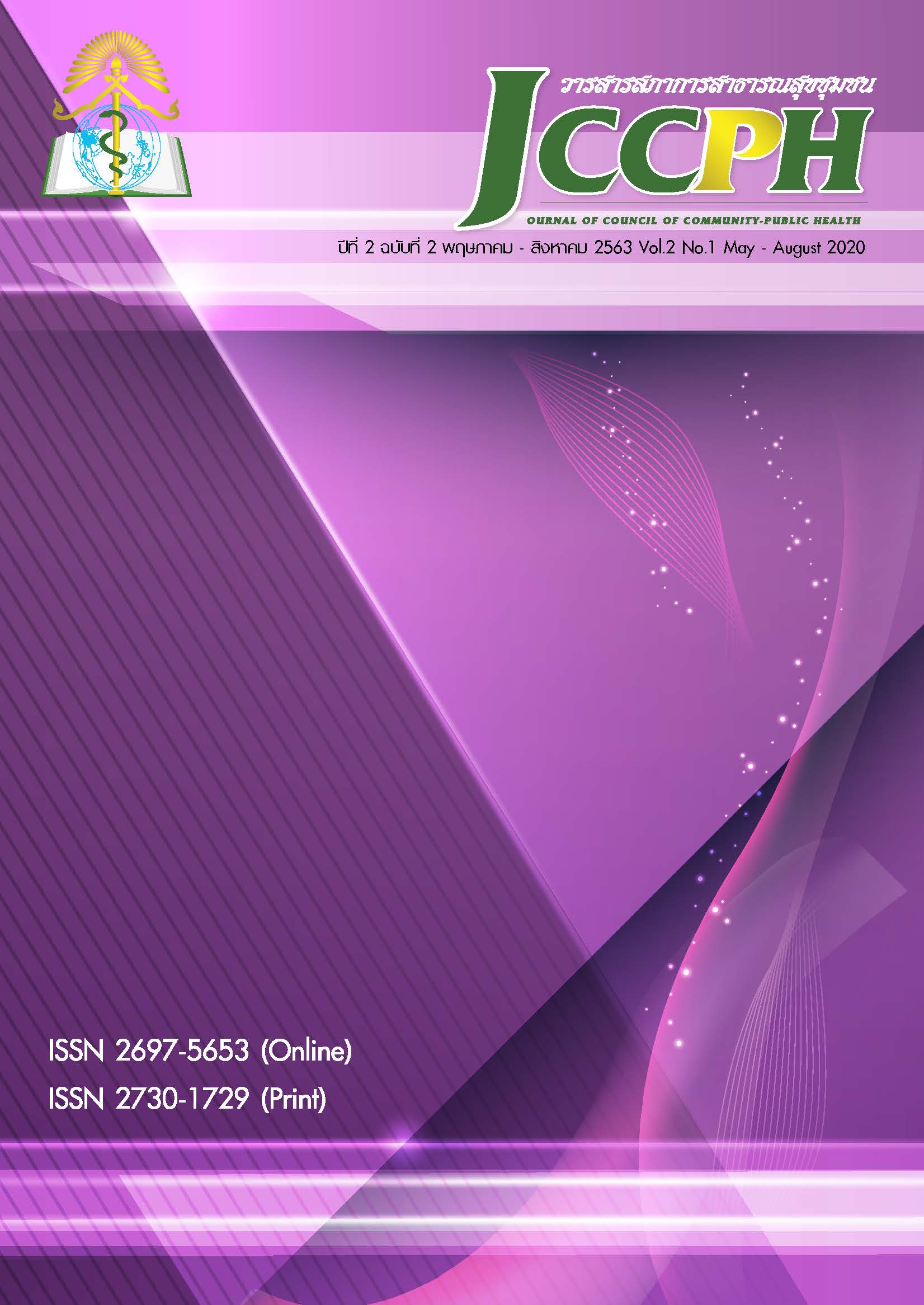ประสิทธิผลของโปรแกรมทันตสุขศึกษาโดยประยุกต์ใช้ทฤษฎีความสามารถของตนเองที่มีผลต่อพฤติกรรมการดูแลทันตสุขภาพของนักเรียนประถมศึกษาปีที่ 4-6 จังหวัดสุพรรณบุรี
คำสำคัญ:
ความสามารถของตนเอง, พฤติกรรมทันตสุขภาพ, คราบจุลินทรีย์บนตัวฟันบทคัดย่อ
การวิจัยนี้เป็นการทดลองเบื้องต้นดำเนินการวัดผลก่อนและหลังการทดลอง มีวัตถุประสงค์เพื่อศึกษาประสิทธิผลของโปรแกรมทันตสุขศึกษาโดยประยุกต์ใช้ทฤษฎีความสามารถของตนเองต่อพฤติกรรมการดูแลทันตสุขภาพของนักเรียนประถมศึกษาปีที่ 4-6 จังหวัดสุพรรณบุรี จำนวน 30 คน โดยการสุ่มอย่างง่าย ใช้ระยะเวลาทดลอง 5 สัปดาห์ การเก็บรวบรวมข้อมูลโดยใช้แบบทดสอบความรู้เกี่ยวกับทันตสุขภาพ (KR 20=.71) แบบสอบถามพฤติกรรมทันตสุขภาพ (Cronbach’s Alpha = .72) แบบบันทึกปริมาณคราบจุลินทรีย์ และแบบประเมินทักษะของการแปรงฟัน วิเคราะห์ข้อมูลโดยใช้ ร้อยละ ค่าเฉลี่ย ส่วนเบี่ยงเบนมาตรฐาน และ Paired Sample t-test ผลการวิจัยพบว่า
ภายหลังได้รับโปรแกรมทันตสุขศึกษานักเรียนมีความรู้เกี่ยวกับทันตสุขภาพ และทักษะการแปรงฟันที่ถูกวิธีดีกว่าก่อนได้รับโปรแกรมทันตสุขศึกษา และมีปริมาณคราบจุลินทรีย์บนตัวฟันน้อยลงกว่าก่อนได้รับโปรแกรมทันตสุขศึกษา อย่างมีนัยสำคัญทางสถิติ (P<0.05)
แสดงให้เห็นว่าโปรแกรมทันตสุขศึกษาโดยประยุกต์ใช้ทฤษฎีความสามารถของตนเองในนักเรียนสามารถทำให้ความรู้เกี่ยวกับทันตสุขภาพ ทักษะการดูแลทันตสุขภาพ และอนามัยช่องปากดีขึ้น
เอกสารอ้างอิง
Boocha, S. & Somphong, S. (2019). Effectiveness of dental health education program by application of self-efficacy theory on gingivitis prevention of grade nine secondary school students in Tao Ngoi district in Sakon Nakhon Province. Thai Dental Nurse Journal, 29(2), 1-12. (in Thai)
Buathong, Ch., Promsiripaiboon, Y. & Vatchalavivat, A. (2015). The effects of oral health promotion Program on dental caries prevention behaviors of grade six students at Banbanghean school at Plaipraya district, Krabi province. community health development quarterly khon kaen university, 3(2), 293-306. (in Thai)
Bureau of Dental Health. (2013). The 7th National oral health survey, Thailand 2012. Bangkok: WVO Officer of printing mill. (in Thai)
Bureau of Dental Health. (2018). The 8th National oral health survey, Thailand 2017. Nontaburi: Samcharoen Panich. (in Thai)
Inpun, W. (2015). Effect of dental health program to dental caries prevention behavior among sixth grade students of Anubanprachinburi school. Phranakhon Rajabhat Research Journal, 10(1), 131-142. (in Thai)
Junthorn, R. (2016). Effecttives of dental health education program for changing dental health behavior of primary students in Maungmunicipality school in Namaung subdistrict, Maung district, Chachoengsao province. J Prapokklao Hosp Clin Med Educat Center, 33(4), 340-353. (in Thai)
Kamponngam, N. (2015). The effects of a health education program on tooth decay prevention for the primary school students through the application of a self-efficacy theory and social support theory. Journal of Rajanagarindra, 12(28), 179-186. (in Thai)
Kesornrat, Ch., Dawloy, N. & Sirisrichan, P. (2017). The oral health behavior and oral health status of grade six primary school students in Surin province. Thai Dental Nurse Journal, 28(2), 28-44. (in Thai)
Niederman, R. & Sullivans, M.T. (1981). Oral Hygiene Skill Achievement Index. Journal of Periodontology, 3(52), 143-156.
Rosphirom, S., Malarat, A. & Tapchaisri, Ch. (2014). The effectiveness of a dental health education program applying self-efficacy theory on dental health behavior of Prathomsuksa 4 students in Muang district, Nakronpathom province. Journal of Faculty of Physical Education, 16(1), 147-157. (in Thai)
Suphanburi Public Health Office. (2018). Information to respond to the oral health service plan. Retrieved June 7, 2018 from https://spb.hdc.moph.go.th/hdc/main/index_pk.php

ดาวน์โหลด
เผยแพร่แล้ว
ฉบับ
ประเภทบทความ
สัญญาอนุญาต
- บทความหรือข้อคิดเห็นใด ๆ ที่ปรากฏในวารสารสภาการสาธารณสุขชุมชน ที่เป็นวรรณกรรมของผู้เขียน บรรณาธิการ ไม่จำเป็นต้องเห็นด้วย
- บทความที่ได้รับการตีพิมพ์ถือเป็นลิขสิทธิ์ของ วารสารสภาการสาธารณสุขชุมชน


